This is copied from online from a newsletter sent out in 2005:
The Toronto District School Board Kindergarten Early Language Intervention (KELI) Program has recently published a cook book with recipes and activities to stimulate language development. Snack time is an important part of the KELI program and it is designed to provide many opportunities for students to use and expand their oral language, literacy, and social communication skills. While children learn how to make snacks, they also learn to label and classify objects, sequence events for a purpose, ask a variety of questions, and look for familiar words in recipes.
This is also copied from online more recent in 2009
Kindergarten Early Language Intervention (KELI) Program
The KELI Program is an innovative program implemented in September 2001 and is offered in ten host schools in the TDSB. The KELI Program provides an intensive oral language and early literacy program to groups of students in senior kindergarten who have delayed oral language development. The mission of this early intervention program is to enhance young students' understanding and use of oral language as the basis for learning to read, write, and get along socially.
KELI Program students attend their regular home school Kindergarten program either five mornings or five afternoons a week. In addition, they attend the KELI Program two half-days in the other half of the day. The KELI Program is provided by a teacher and speech-language pathologist as an instructional
team.
Eligibility for the Program
Eligible students will attend the regular Senior Kindergarten program at one of the selected high-needs schools and should:
• be age appropriate for Senior Kindergarten (i.e., 5 years of age)
• demonstrate significant delays/difficulties in oral language comprehension and/or expression
• demonstrate ability to learn from group instruction
• demonstrate language difficulties in their first and second languages, if English is their second language
• have attended school regularly during the previous academic year
• not demonstrate serious behavioural or attentional problems or have a diagnosis (e.g., Autism Spectrum Disorder)
• have parent(s)/guardian(s)/caregiver(s)/family provide written permission for screening by a KELI speech-language pathologist
Admission to the Program
Kindergarten teachers of the selected high-needs schools use a specific checklist to nominate students at the end of the Junior Kindergarten year. With parent(s)/guardian(s)/caregiver(s)/family permission, speech-language pathologists screen the students, using a standardized test. Students who best meet
the criteria of the program are admitted.
Parent(s)/guardian(s)/caregiver(s)/family must attend an initial meeting to receive complete information about the program and parent(s)/guardian(s)/caregiver(s)/family expectations, and to give written permission for assessments by speech-language pathologists, program evaluation, and videotaping for
professional development purposes.
KELI Program Locations
The KELI Program is offered at ten host schools across the TDSB. Each program accepts eligible students from several referring schools with a total Junior Kindergarten population of about 1000 students with high needs according to the 2004–2005 TDSB Learning Opportunities Index of socio-economic
factors.
Host schools are located within a short travel distance from a cluster of selected schools. Students are transported by bus, except for those students registered at host schools.
Expected Outcomes
Significant gains in oral language development and early literacy skills are expected for KELI Program students. Students eligible for the KELI Program comprise the lowest achieving Senior Kindergarten children. Although the exact percentage of KELI students at risk for school failure and placement in special education programs is impossible to determine, it is estimated that it is the majority, in view of the combination of the following factors:
• Significant speech and language delay at age 4–5 years
• Children from inner-city schools
• High number of families speaking English as their second language
Without the early intervention of the KELI Program focus on oral language, literacy, and social communication, almost all of those at-risk students would likely require school-based resource programs, professional support services, and/or special education programs during their school years.
Information about their teachers:
Kindergarten Early Language Intervention (KELI) Program Teachers
These positions are part of the TDSB’s Early Intervention Initiative. The KELI staff will work under the supervision of the Supervising Principals of Special Education and Chiefs of Speech-Language Pathology for the assigned quadrant office. The KELI Programs are offered in ten host schools across the quadrants
of the TDSB.
The KELI Program is an intensive oral language and literacy enhancement program for Senior Kindergarten children with significant oral language processing and expressive language delays. Each of the ten sites will serve 32 students. The goal is to reduce the impact of oral language delays on young students’ literacy, academic, and social development. Students selected will be screened for eligibility by KELI speech-language pathologists and/or KELI teachers, but will not be formally identified by an IPRC.
Students with severe communication problems related to diagnosed disabilities (e.g., Autism Spectrum Disorders, Global Developmental Delay) will not be selected. Students admitted will attend the KELI Program for two half-days per week in addition to their home school Kindergarten from October to early June of their Senior Kindergarten year. The KELI teachers will work in instructional teams with speech language pathologists, who will assess the students at the beginning and end of the program.
Parent(s)/guardian(s)/caregiver(s)/family and referring teachers will rate the students’ communication skills on entry and exit.
The teacher, in collaboration with the KELI speech-language pathologist, will:
• implement oral language and early literacy programming to meet the needs of the KELI students
• instruct four groups of eight Senior Kindergarten students, for a total of 32 students
• observe the KELI Program students in their home school Kindergarten programs and provide programming suggestions/supports for their teachers
• evaluate KELI program students’ oral language, early literacy, and social communication skills
• communicate regularly with and provide support for parent(s)/guardian(s)/caregiver(s)/family of KELI Program students
• report orally in each term and in writing to parent(s)/guardian(s)/caregiver(s)/family and home school teachers mid-program and on completion of the program to parent(s)/guardian(s)/caregiver(s)/family and home school teachers
Hope that helps you to understand what this new school is.
But for now you get some serious cute photos of Kyler getting ready for his first day of school:
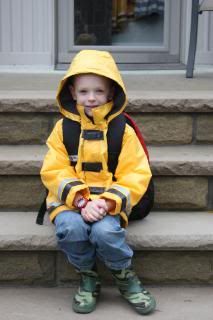
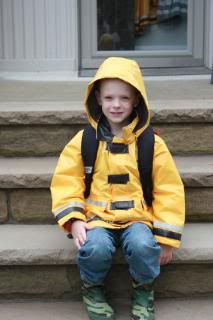
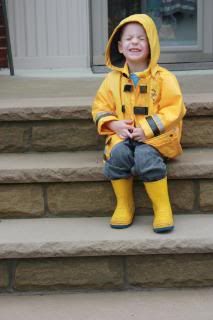
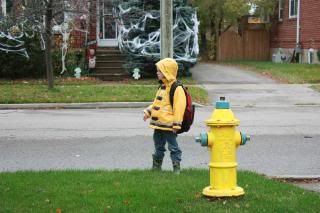
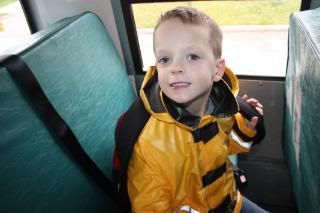
And his second day of school:
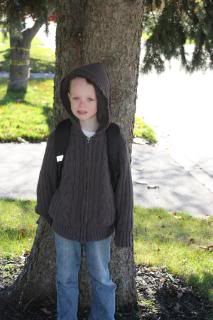
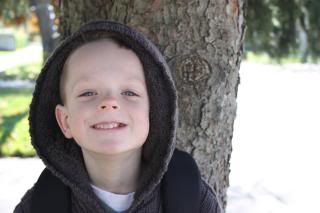
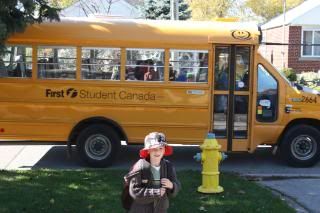

Hello, Did you find that KELI worked for you child?
ReplyDelete